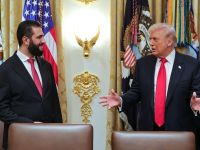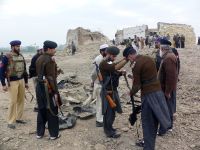Formal relations with Britain came as a new diplomatic coup for North Korea, but there will be no celebrations in Pyongyang until the United States has an embassy there, analysts said.
And as Britain follows Italy among the Group of Seven industrialized powers in deciding to establish ties with the communist state, it is also becoming clear that opening up to the world does not mean lifting barriers to unwanted foreign influences.
Foreign Secretary Robin Cook announced in Seoul on Thursday that Britain would establish relations with the Stalinist administration led by Kim Jong-Il.
"This opening of diplomatic relations is not in any way an approval of the conduct of the regime," Cook told BBC radio from Seoul, where he is to attend the third Asia-Europe meeting (ASEM) summit.
Concerns about human rights and the North's missile and nuclear programmes were overridden by what Cook said was the need to help Kim Dae-Jung, South Korea's Nobel Peace Prize winning president, "to engage North Korea by bringing it in from the cold."
Kim began the thaw by holding a historic summit with the North's supreme leader Kim Jong-Il in June.
Japan has also made serious moves to get closer to the North and Germany had a vice foreign minister in Pyongyang this week.
However, the United States is the diplomatic scalp that North Korea really wants. And that could see major progress when US Secretary of State Madeleine Albright visits Pyongyang for two days from Monday.
Albright said she will meet Kim Jong-Il and discuss arms proliferation and terrorism concerns. Success could see President Bill Clinton visit the North and Pyongyang establish diplomatic ties with the nation demonized by the North's state media since the stalemated end of the Korean War in 1953.
Italian Foreign Minister Lamberto Dino said in a recent interview in Seoul that North Korea's attitude has changed dramatically in the past six months.
Dini, who went to Pyongyang in March, one month before the two Koreas announced they would hold their historic summit, said: "I noticed a great difference in attitude, in the kind of rhetoric that was used during my visit to Pyongyang and the way the North Korean authorities are looking at problems today."
Before, he highlighted, discussions had been dominated by objections to South Korean policy and opposition to the US military presence in South Korea.
"What the North wants is a secure political relationship with the United States and in return it is prepared to make concessions," said Leon Sigal, a professor at the Social Science Research Council in New York with wide contacts in North Korea.
Sigal, who has been critical of US policy toward the North in the past, told AFP he believes North Korea is about to agree a new deal on its missile program which could see aid "compensation" of between one billion and two billion dollars given to Pyongyang.
But Sigal and other experts have warned that the world should not expect to see major changes in the North as long as the ruling Workers Party seeks to extend its hold on the country, with Kim Jong-Il treated as a demi-god.
South Korea has already complained that the North is holding up reconciliation projects, and international access to the country remains severely restricted despite its chronic food problems.
"They are not going to open up their country, they are only going to change certain things," said Sigal.
North Korean people who Sigal has spoken to tell him that Kim Jong-Il "is helping us by changing the relationship with the Americans. He is helping us to grow more prosperous" -- SEOUL (AFP)
© 2000 Al Bawaba (www.albawaba.com)







